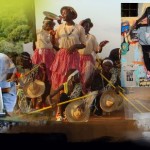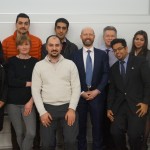Mahlea Babjak is reading for a PhD in Religious Studies and is researching human trafficking in South Asia. She is a Global Justice Academy Student Ambassador for 2016-17. Here, Mahlea reports on the recent Tumbling Lassie seminar on Trafficking in the UK.
The Faculty of Advocates, as well as other lawyers and justice advocates, gathered on the 28 of January 2017 to hear from key stakeholders fighting human trafficking in both the UK and abroad, due to the interlinking nature of trafficking networks.
The seminar opened with a short history of The Tumbling Lassie, followed by a compelling talk led by Andrew Bevan of International Justice Mission (IJM). When Andrew stated that the IJM’s mission to “rescue thousands, protect millions and prove that justice for the poor is possible” was an ambition being met (with IJM currently protecting an estimated 21 million), I was filled with hope and reminded that seemingly impossible justice goals are never beyond reach.
Andrew traced the story of one woman whom IJM worked with in India. The woman was trafficked for labour and enslaved at a brick kiln under debt bondage for forty years. Our hearts grew heavy as we felt the weight of one brick that Andrew passed around the seminar from the kiln. Andrew is passionate about seeing students, businesses and lawyers in Scotland becoming advocates in anti-human trafficking. As Andrew stated, you can “use what’s in your hands to respond” to the global justice issue of human trafficking.
We then heard from the Solicitor General for Scotland, Alison Di Rollo, who emphasised her (and the Lord Advocate’s) desire to “make the invisible visible” by improving our ability of detecting, challenging, and reporting cases of trafficking in the UK (see photo).
 Alison’s talk drew widely on the general approach of the justice system in Scotland and about their commitment to safeguarding human trafficking victims rights, working collaboratively with NGOs and academics, and prosecuting traffickers. While many would be surprised to hear that trafficking is indeed happening in Scotland and the UK widely, Alison noted common destinations in Scotland and discussed several cases as examples and stressed that improving our ability to detect victims of trafficking as critical.
Alison’s talk drew widely on the general approach of the justice system in Scotland and about their commitment to safeguarding human trafficking victims rights, working collaboratively with NGOs and academics, and prosecuting traffickers. While many would be surprised to hear that trafficking is indeed happening in Scotland and the UK widely, Alison noted common destinations in Scotland and discussed several cases as examples and stressed that improving our ability to detect victims of trafficking as critical.
Alison’s talk led nicely to Bronagh Andrew’s of TARA (Trafficking Awareness Raising Alliance), a sector of Community Safety Glasgow. Alison shared about how TARA offers a support service to trafficking survivors and helps to identify victims of sexual exploitation. TARA has a unique survivor-led approach, which has provided survivors with hope as their survivors re-learn how to trust people and the legal system. The work of TARA has empowered survivors through TARA’s ability to support survivors on a long-term basis, until the survivors express that they feel they’ve regained a sense of agency.
The final speaker was Parosha Chandran, an award-winning human rights barrister and receiver of the ‘Trafficking in Persons Hero Award 2015’ from former US Secretary of State, John Kerry. Parosha spoke about establishing rights recognition for victims of trafficking and she over-viewed some of the ground-breaking trafficking cases she has worked on over the past 15+ years, which have come to shape anti-trafficking efforts in the UK. A theme that would be interesting to explore further from Parosha’s presented cases is the often out-dated relationship between the justice system and Home Office. Since much of Parosha’s discussion was technical, legal language, she has offered to share her powerpoint that outlines the major human trafficking cases in the UK if requested by email.
Overall, this event sparked both hope within attendees and a desire to see more anti-human trafficking seminars combining major UK law firms and legal advocates. I would highly recommend people mark their calendars in advance for whenever the next Tumbling Lassie seminar may be.
More about the author
Mahlea is also the Emerging Fields Researcher for Tiny Hands International, an NGO fighting human trafficking globally through border and transit monitoring. Mahlea can be contacted at: mahlea@tinyhands.org.
The Tumbling lassie
If anyone is interested in this field and would like to get in touch with The Tumbling Lassie directly, you can email them here: tumblinglassie@gmail.com






